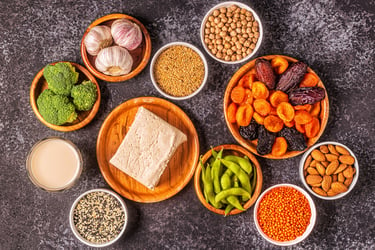eStoreRx™
Online Supplement Dispensary
eStoreRx™ is an easy direct-to-patient ordering & fulfilment program for lifelong wellness.
For over 40 years, Biotics Research Corporation has revolutionized the nutritional supplement industry by utilizing “The Best of Science and Nature”. Combining nature’s principles with scientific ingenuity, our products magnify the nutritional
eStoreRx™ is an easy direct-to-patient ordering & fulfilment program for lifelong wellness.
Biotics Research is proud to expand our commitment to education with the Wellness Unfiltered Pro Podcast. Each episode delves into key health topics and the clinical applications of our premier products. Through candid, insightful conversations, our team offers practical guidance to keep you informed and empowered as a healthcare professional.
February 26 2026
A study published recently in the Journal of Cachexia, Sarcopenia and Muscle raises concerns about a possible side-effect of long-term statin drug use...
 A recent study has found that a higher intake of foods containing dietary phytoestrogens may be associated with a lower risk of all-cause and cause-specific mortality from certain conditions.
A recent study has found that a higher intake of foods containing dietary phytoestrogens may be associated with a lower risk of all-cause and cause-specific mortality from certain conditions.
Dietary phytoestrogens are plant-based nonsteroidal compounds, including isoflavones, lignans, and coumarins, that exert weak estrogen-like activity. They are found in a variety of foods, including legumes (most notably soy products), flaxseed, and whole grains. While evidence relating dietary phytoestrogens to mortality levels is currently limited, they have gained considerable attention for their potential health benefits with the Dietary Guidelines for Americans suggesting legumes, soy products, and whole grains should be included as part of a healthy diet.
Previous studies have associated dietary phytoestrogens and their primary food sources with improved cardiometabolic risk factors (including lowered blood pressure and improved insulin resistance), improved cognitive function and increased immune health, alongside the reduced risk of cardiovascular disease (CVD) and breast cancer. It is postulated this is due to the antioxidant and anti-inflammatory activity of phytoestrogens. However, studies focused on dietary phytoestrogens in relation to total mortality have yielded conflicting results ranging from negative to positive associations between the two or no statistically significant link at all.
This new study sought to examine the association between the intake of isoflavones, lignans, and coumarins and total and cause-specific mortality in US males and females. Researchers followed nearly 76,000 healthy females in the Nurses’ Health Study (1984–2018) and over 44,000 healthy males in the Health Professionals Follow-up Study (1986–2018). Their diet was monitored every 2-4 years throughout the study using food frequency questionnaires. 50,734 deaths were documented during the study, including deaths from CVD, cancer, and other causes.
Results found that higher intake of total phytoestrogens, isoflavones, lignans, and coumarins was associated with reduced risk of total, CVD, and other causes of mortality. However, this did not extend to cancer mortality. Primary food sources of phytoestrogens, including tofu, soy milk, whole grains, tea, and flaxseed, were also found to be inversely associated with total mortality.
Researchers conclude a higher intake of phytoestrogens and phytoestrogen-rich foods may be associated with a lower risk of total and certain cause-specific mortality in generally healthy US adults. They do note that study participants were mainly healthcare professionals of European descent, limiting the validity of these findings across other racial, ethnic, and socioeconomic groups.
However, the study concludes that the results support emphasis in dietary guidelines on the consumption of plant-based foods, including phytoestrogen-rich foods such as legumes, whole grains, fruits/vegetables, flaxseeds, and tea to help support increased longevity.
Submit this form and you'll receive our latest news and updates.
Just published in the Mayo Clinic Proceedings is an analysis of the link between the “Mediterranean lifestyle” (comprise...
Learn moreA recent prospective cohort study of nearly half a million tea drinkers from the UK found that intake of tea at a level ...
Learn moreA recent study has found a link between higher legume intake and lower all-cause mortality and stroke. However, no assoc...
Learn more
*These statements have not been evaluated by the Food and Drug Administration. This product has not intended to diagnose, treat, cure, or prevent any disease.
© 2025 Biotics Research Corporation - All Rights Reserved
Submit your comment